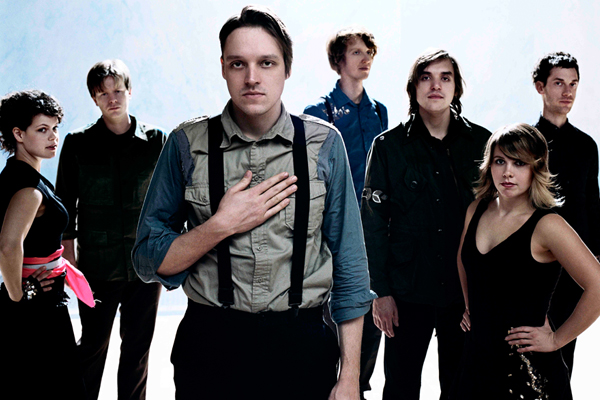Modern Times: A voice from the Wilderness
Columns, Features, Modern Times - Posted on Tuesday, September 14, 2010 4:39 - 11 Comments
You never know what snippets of conversation you’ll pick up in a restaurant. “Have you seen the new Arcade Fire video?” said a girl to her friend at a table next to me this weekend. “It’s amazing. I sat in front of my laptop and cried my eyes out.”
“It’s interactive”, she continued, “and I don’t want to spoil it for you, but it means a lot if you don’t live at home anymore. Just Google it when you get back.” My interest piqued, I scribbled a note on a piece of napkin and tucked in into my pocket to be dug out the next morning. (If you haven’t seen it yet, click on the above picture or follow this link then come back. I wouldn’t want to spoil it for you either).
Sat in front of my screen I didn’t quite cry my eyes out, but I did get that goosebumps sensation that comes with taking a sneak peak at how the future will look. It’s a new type of viewing experience, with multiple windows showing simultaneous camera angles, the prompt to write your own message into the story, and of course the powerful and somewhat eerie personalisation; I’m sure I’m not the only one for whom the melodic yearning of the soundtrack covered up a sharp intake of breath at the sight of my house, my street, my life becoming part of the story.
The clip has generated a great deal of hype already, most of which falls into two categories: the first is summed up by the “Arcade Fire Reinvent the Music Video” type headline – gaggles of music journalists and arts critics gushing breathlessly about an indie-rock band pioneering the use of cutting-edge media to reach their audience on a new level.
Truthfully though, The Wilderness Downtown (for that is its name) is a music video for Arcade Fire in the same way that ‘An Inconvenient Truth’ is a documentary about Al Gore. But it seems to be only the second school of commentators – the media theorists, tech bloggers and web developers – who understand that the music is only an incidental vehicle for a beautiful experiment which heralds a new era of web experience.
The real star of the video is the HTML5 web format and Google’s Chrome browser (plus the oft-overlooked CSS3-style sheet language), and the mesmerising, seamless new mode of mash-up content generation arising from their combination. The experience allows, amongst other things, the plugging of a gap in cinema’s vocabulary of perspective; for whilst in literature storytellers have been experimenting with second person for a while now (most of us will have read a ‘You choose the ending’ story at some point in childhood, or maybe later in a more high-brow equivalent in Italo Calvino or Gunter Grass), the idea of a filmic equivalent was hitherto absent.
In more general terms, what TWD hints at is the idea of a video and visual media which is no longer a cut-and-dried artefact, but more of a template onto which individual experiences and preferences can be overlaid. With location awareness a standard feature of next-generation phones, and the increasing trend for consolidation of online profiles, the future seems to be moving inexorably towards bespoke information delivery across multiple platforms, and a world where ever more stories and narratives will take the same ‘one archetype/many variations’ model.
It seems like an exciting place to be. As you finish reading this article, you stop and ponder the possibilities of a new phase of web experience. To run out and embrace them, turn to page 45.
Corin Faife is a writer and activist. His ‘Modern Times’ column appears every Tuesday.
11 Comments
Dave
Usayd
Thanks for sharing the link Colin, it’s the first I’ve seen of its kind. From a technological perspective, it is certainly ‘exciting’, but Dave raises a valid argument – many ‘advancements’, particularly in technology, serve to stunt progression rather than further it.
I’m interested to see what the future holds, and I need to get on this HTML5 (sorry, CSS3) thing!
Corin Faife
Thankyou for your comments Dave and Usayd. In response, I agree that Google has, of recent times, acted in a way that often belies its ‘don’t be evil’ motto, and it is important to be wary of an entity that wields so much power in the internet realm. Their work is nevertheless groundbreaking, and with the wealth of information they can draw on they are better placed than most to predict how we will come to use the web. I don’t set out to portray Google as cuddly, just way ahead of the curve on development.
Re: point 2, I strongly believe that location awareness and profile consolidation are thrilling and terrifying features in equal measure, but as to removing the individual from the social context I disagree. Most of the uses of geo-tagged information are inherently social – the popular Foursquare application for one example, or the proliferation of sites compiling reviews or photos by area, for sharing with other users in the location. This kind of internet usage has potential to strengthen rather than atomise community bonds. And re: point 3, I wouldn’t put it quite so bluntly, but we have to bear in mind that it’s the first of its kind. Things will only become smoother and more sophisticated from here.
As a post-script, the nature of a short article is that you can never explore all avenues of thought, and so many ambiguities or paradoxes can never be fully treated. In that sense it’s always good to expand the debate with a solid critique from readers too.
Wilson Bentley
The “‘one archetype/many variations’ model” is being developed in many fields and disciplines at the moment, which is interesting. It’s a phenomenon that is readily observed in nature. For example, no two snowflakes are identical though they all follow the same basic rules and the formation process is common.
In architecture the avant guarde, lead by schools like the AA and offices like Zaha Hadid’s, are now doing a lot of work based on this kind of approach. It’s all made possible by advances in computing technology, CAD/CAM interfaces, integration of modelling software with advanced mathematics etc
It’s interesting, no doubt. BUT, will such developments help humanity to address the array of social, ecological and spiritual crises which we now face? Or are these things simply further distractions which encourage avoidance of fundamental truths and the bigger picture? Is this part of the grand web of deception which we weave to blind ourselves from more pressing and basic issues (such as social justice, universal access to basic needs, the long term viability of our lifestyles etc)?
Alex
I thought the video was awesome and quite moving and immediately told everyone I know about it. To Wilson, I think this kind of puritanical piety is misplaced and tiresome – I think one is quite capable of watching a music video and also considering the issues of social justice of our time. And I actually think models derived from, say, the open standards of the internet are politically useful, if not vital.
Alex
PS I’d the whole ‘internet is atomising and capitalist’ thing is quite silly also, and needs to be replaced by a more complex understanding of what the internet is positively and negatively – I went to a conference yesterday and met people I knew pretty well who I had never met in real life, but I actually knew pretty damned well. The internet can be hugely pro-social as well as alienating.
Wilson Bentley
I wasn’t trying to be puritanical. I didn’t attack the internet or other ‘open source’ technological developments in general. Nor was my comment a criticism of the video specifically. I’m just raising the issue. While we wank-off on the latest accessible technological developments, maybe there are some basic things we would be wise to remember. These techno advancements aren’t an indisputable good in their own right.
Alex
Yes, that is precisely puritanical, because it depends on the false idea that somehow one can’t think a video is cool and worry about the world. This kind of ‘raising the issue’ – say ‘how dare you speak of this when so much other stuff is going on’ is precisely pious and puritanical in the worse sense – it raises your power over others by emphasising your greater purity (‘I never cease to talk about the really big important stuff in life’) while simultaneously condemning people who, you know, in a down moment might like to enjoy a music video (‘you are inferior people and inferior to me’). This is the historical social dynamic of puritanism. In fact your response was so predictable I might create a bot which automatically posts this kind of knee jerk every time an article on something vaguely cultural goes up.
Puritan_Bot 1.0
Actually, my comment wasn’t about the video at all, nor about issues of life/work/activism balance. I was hoping to stimulate a little debate/discussion about techno-fetishism in modern society, in more general terms… It seems to me that this kind of reverence of our own genius is perhaps the same physiological disposition/ strand of ideology which gives many people faith that we can ‘geo-engineer’ our way out of climate chaos, for example. The phenomenon is so ubiquitous that occasionally, mild traces of it even turn up in Ceasefire articles.
Clearly this wasn’t an appropriate forum for me to pursue tangents so tenuously related to the article content, and now I’ve gone and gotten people’s backs up. The intention wasn’t to parade my own fictions purity or to put others down. If that’s how it seemed I do apologise. Thank you for the video Corin, it’s certainly interesting. I’ll, er, get me coat…
Puritan_Bot 1.10
*psychological.
Alex
Sure, no need to apologise really, maybe I too over reacted. For which I apologise.




Hmm. I’m not sure about this, for a few reasons.
1. It makes google look like a nice cuddly corporation (I have no end of respect for google, but they do some pretty nasty stuff too).
2. “With location awareness a standard feature of next-generation phones, and the increasing trend for consolidation of online profiles, the future seems to be moving inexorably towards bespoke information delivery across multiple platforms, and a world where ever more stories and narratives will take the same ‘one archetype/many variations’ model.”
Is this necessarily a good thing? I mean, this reads like a press release from Apple, or something, and it seems to play very much into capitalism’s reification of the individual removed from any social context.
3. It looks utterly shite.
All that said, you’ve just reminded me that for years I’ve been meaning to write a ‘grown up’ “you choose the ending book” (interestingly (or not), the guy who translated the Oxford World Classics edition of Plato’s Republic wrote a lot of the Sonic ones!!!).